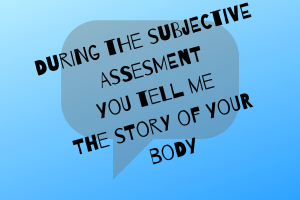Let’s start the conversation
I like to talk about bodies. Mine. Yours. How they feel, how they work, what they’ve been through, where they are going. The story of a body is all brain candy to me. Luckily, as a pelvic floor physiotherapist I get to talk about bodies a lot. Here is what I have decided: talking about our bodies is a life-changing, self-affirming skill necessary for health self-promotion that we need to work on.
Our bodies are our vehicles for action, the way we carry out our thoughts and intentions, the literal embodiment of our values and traditions. If you wish to kneel down to pray, your body has to get you there. If you wish to clear your mind with a brisk hike, your legs and feet have to take the steps. Plant a garden, make a meal, clean yourself, put out a fire. Reach. Climb. Drive. Eat. All the verbs, the action words – they are what our body is built to do.
Promoting healthy bodies is a physio’s mantra. We check on the status of your moving parts and coax them to learn new tricks designed to take the challenge out of everyday activities. This process is made easier when my clients can tell me about their bodies and their experience within it.
Let me give you some hints about what a physio needs to know about you.
You need to tell me how your body is feeling.
I ask a lot of questions about why you have come for physio.
 The reasons are myriad. Pain is commonly cited. Leaking urine and feces. Prolapse. Also, stiffness, fatigue, feeling uncoordinated. Lack of performance. Altered sensation like tingling, burning, numbness. Whatever the reason you are in my office, I want to know when it started, what and how it behaves, what makes it better or worse and how are you addressing it?
The reasons are myriad. Pain is commonly cited. Leaking urine and feces. Prolapse. Also, stiffness, fatigue, feeling uncoordinated. Lack of performance. Altered sensation like tingling, burning, numbness. Whatever the reason you are in my office, I want to know when it started, what and how it behaves, what makes it better or worse and how are you addressing it?
You need to tell me what other things have happened to and within your body in the past.
This is the context within which this latest problem has begun. The scope of this conversation is your entire life. We talk about all your injuries, and medical tests of relevance, ever. All your trips to emergency and any stay in hospital. All your surgeries. We talk about all the activity you have done in your body – sports, hobbies, jobs. We talk about if you are in relationships, are you working and what do you do. We talk about what other medical things you manage with lifestyle modifications or prescription or over-the-counter medications. We talk about stress and how it impacts you.
Keep in mind that chronology matters – the timeline of the story. Like in any good story it helps make sense of the events along the way.
You need to tell me your goals
All this talking about your body is well and good but without knowing where you would like to take your body it’s pretty meaningless. Knowing your goal allows me to determine if it is reasonable, how long it might take and when we are finished. Identifying the goal for yourself can be more challenging than first expected. All kinds of goals are acceptable, save one.
What are goals I can’t use?
Let me give you an example: Tanya* has a painful low back. This is new for her, has been quite intense and causing her to have to change her life. She is frustrated. Fearful that this will always be the way things are from now on. When I ask her about her goals she states: ‘to not have any pain”. Due to what neuroscientists have discovered about pain, this is the wrong target. If we only focus on pain-reduction, we will not be successful because what you focus your attention on becomes amplified. The opposite of going away. And here is the thing. For me, as a physio, a reduction in pain is always the goal. It is a huge barrier to enjoyment of life. If it is within my power to reduce or cure your pain, I will be trying to accomplish this. Instead we will focus on movement related goals. I ask Tanya: if you could DO one thing right now that would make your life better, what would it be? You only get one. That thing is an action, a doing. What is it? *Not her real name.
You need to tell me how your body feels as it moves.
I perform a Whole-Body Assessment on each patient I see, during movement. This is important so I can see and feel how your bones and muscles put movement together. I use my hands to be your muscles and make the bones move how they should during the movement we are looking at. When I do this for one region, all the rest of your body responds to this change of pattern and that lets me predict what might occur if I treated this area. It’s powerful and a skill set I have worked within for a long time. I can see and feel changes in movement and know when they are optimal. However, if you can’t tell me how the correction feels to you, we lose an essential tool of diagnosis.
You need to tell me how you responded
After all that talking and assessing I will have a hypothesis about why you feel how you do. We will come up with a plan of action to treat your specific body with its unique concerns in the specific way that your body will allow treatment to occur. For some, I can explain what is happening and that understanding can be enough to alleviate the fear of unknown and calm the nervous system. Some need to breathe. All will move in whatever way I can facilitate they do so.
What you need to tell me during follow up

When you come for follow up, I will ask how you felt for the first 24 hours after treatment, and then the sequence of events that happened during the time that followed. Two things are important – did you do your exercise and how did it make you feel when you did? I use this information to determine what the next steps will be.
In the end, treatment is a whole lot of talking about you and your body. Are you excited by the idea of having a place to tell me about what it is like to move through your world or does it exhaust you? If it’s the latter, consider practicing before you approach a practitioner or your doctor. You are coming to us because you need something to be different. What is it? What does it keep you from? Tell me the story of your body. I really want to know.

About Gillian:
Gillian McCormick is a Pelvic Health Physiotherapist with over 20 years of experience, passionate about elevating homo-sapiens through rehabilitation, education and love.
Find her at www.physiogillian.com. For a free PDF of Common Descriptive Body Words send an email with “Body Words” in the subject line to [email protected].
Make sure to also check out Gillian’s previous guest article on Incontinence and Dementia, how the two are often linked and what you can do to strengthen your pelvis floor muscles.
